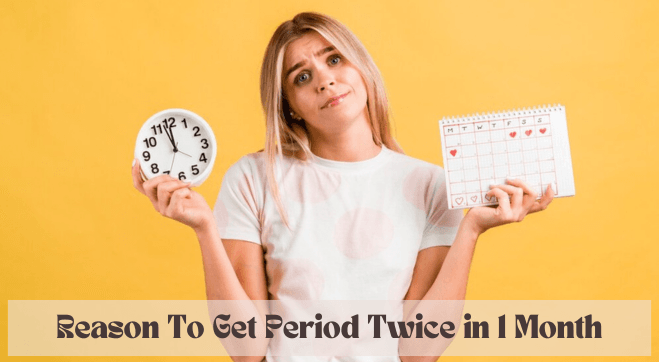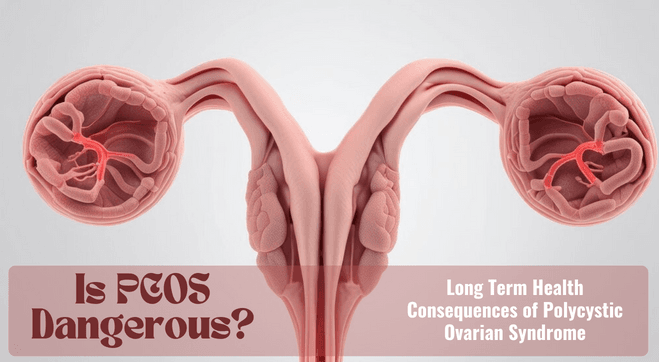Is It Normal to Have Periods Twice a Month?
Wondering about can periods come twice in a month? Well, Menstrual cycles are a natural part of life for those with a uterus, yet they can sometimes cause confusion and concern, especially when they deviate from the norm. One such deviation that often raises questions is having periods twice a month.
Experiencing periods twice a month can be concerning and confusing for many women. While a typical menstrual cycle ranges from 21 to 35 days, there are instances where a woman might have two periods within a single month. Approximately 26% of all women fall under the category of reproductive women. Typically, periods last for anywhere between 2 and 7 days. 1
But if you have already had your period in a month and you still start bleeding, the reasons can range from puberty to menopause. You might have shorter or longer menstrual cycles than usual during this time. It results in inconsistent bleeding and might cause a woman to menstruate two times in a month.
However, the actual reason behind getting periods twice a month can vary for every individual based on personal factors.
I Already Had My Period This Month, Why Am I Bleeding Again?
A short menstrual cycle and a long menstrual cycle can both be the answers to why you are bleeding despite having done with your periods for the month. 2
However, during adolescence, when the body undergoes several hormonal changes, getting a period twice a month becomes more common. The frequency and length of a menstrual cycle might vary for every person during the initial reproductive years.
But if you don’t get your first period until the age of 15, you can take a female hormonal profile test to identify the causes and get timely treatment accordingly. 3
What Causes A Woman To Menstruate Twice In A Month?
Two periods in one month can happen for many reasons. Examples include the following:
- Perimenopause (the changes that happen right before menopause)
- Thyroid problems (hyperthyroidism and hypothyroidism)
- Endometriosis
- Uterine fibroids or polyps
- Occasional period irregularities that might occur due to an underlying issue that is not so serious (such as stress and severe weight changes)
Apart from these, the intake of some specific types of medicines, like birth control pills and pregnancy, can also be the answer to what causes menstruation twice a month.
Let us have a detailed look at what causes bleeding even when you have already had your period in a month.
Missing A Period Once In A While (One-time Anomaly)
Sometimes, the reason could sound as straightforward as the duration of your period being shorter than normal. It can make you go through two periods in one month. However, if it occurs more often, consider digging into the underlying cause and getting treatment accordingly.
Extreme Weight Fluctuations
You can also get periods twice a month if you have undergone extreme weight changes. AUB-O, that is, abnormal uterine bleeding associated with ovulatory dysfunction leads to hormonal imbalance and dysfunction, which ultimately causes you to gain or lose weight.
Apart from AUB-O, weight fluctuations can happen for many reasons, including:
- Psychological stress
- The use of certain types of medication
- Too much or too little physical activity
- PCOS (Polycystic Ovarian Syndrome)
- Problems that are related to the pituitary gland
- Anorexia (an eating disorder)
- Thyroid dysfunctioning
- Premature ovarian failure
- Hyperprolactinemia
- Obesity (unhealthy weight gain)
Among these, obesity is one of the most adverse effects that can be the primary cause of having periods twice a month.
Anovulation (Lack of Ovulation)
Ovulation is the process by which the ovary releases an egg that later gets fertilised by a sperm (in the case of pregnancy). Lack of pregnancy leads to the expulsion of that egg from the body in the form of periods (also called a menstrual cycle or simply menstruation).
The absence of ovulation, a condition where the ovaries do not release an egg during a menstrual cycle, is called anovulation. It can occur in:
- Young girls who have just started getting their period
- Sexually inactive women
- Women who are heading towards menopause
In such instances, AUB-O occurs. It results in abnormal bleeding during a period of a month. These menstrual irregularities can result in periods twice a month. It is essential to note that any woman who is in her reproductive years (teenage to menopause) can go through anovulation due to several factors, including excessive exercise, stress, thyroid dysfunction, and the side effects of some medicines. 4
Puberty
‘I already had my period this month; why am I bleeding again?’ —a common question amongst teenagers who have just started getting their period.
In the initial years of puberty, irregular periods are usually standard. So, there’s nothing to worry about. This phenomenon, often referred to as menarche, is due to hormonal fluctuations typical for girls aged between 10 and 16 years. Commonly, this state is called a girl’s first period. 5
These hormonal changes are a normal part of the body’s development during puberty, leading to physical changes that can temporarily disrupt the regularity of menstrual cycles. It’s important to understand that this is a common experience during the early stages of menstrual health and generally stabilises over time. Therefore, it is one of the primary reasons why you might be getting your periods twice a month.
Perimenopause
Perimenopause is the transitional period leading up to menopause, marking the end of a woman’s reproductive years. Hormone imbalance in women during this time can result in period-related irregularities. So, if you are wondering what the reason is for getting periods twice a month, perimenopause is also one of the explanations. 6
Common symptoms of perimenopause include:
- Hot flashes
- Poor sleep
- Vaginal dryness
- Sudden changes in mood
PCOS
PCOS expands to Polycystic Ovarian Syndrome. It is a hormonal disorder related to malfunctioning of the ovaries. 7
Even though the exact causes of polycystic ovarian syndrome, or PCOS, are not clear, genetic factors might be responsible for the onset. The menstrual irregularities that occur because of PCOS can make you bleed again after you have already had your period in a month.
Symptoms of PCOS include the following:
- Period blood flow that is too low
- Irregular menstrual cycles (variation in the number of days the blood flow occurs as well as the extent of bleeding)
- Insulin resistance
- Absence of periods
- Mild hirsutism
- Acne
- Weight gain
Polycystic ovarian syndrome in women can even result in infertility (a condition that makes a woman less capable of conception).
To understand your body better, you can take a hormone imbalance test. It can help you know the reason for having periods twice a month.
Thyroid Problems
Thyroid diseases occur more frequently in women than in men. The thyroid is a hormone that regulates your metabolism (the breakdown of calories or fats to generate energy) and affects your heart rate. There is a gland called the thyroid gland, which causes a positive or negative impact on the thyroid hormone, affecting its release. This increase or decrease in the thyroid hormone ultimately leads to thyroid diseases. 8
- Hyperthyroidism: When there is excessive release of the thyroid hormone, the condition is called hyperthyroidism.
- Hypothyroidism: On the other hand, if the thyroid hormone is too low, then it leads to hypothyroidism.
Either of these conditions can interfere with your regular menstrual cycle. As a result, your periods might become very light or heavy, depending on your specific case. Ultimately, it might make your period come twice a month.
Stress
Stress has an inverse relationship with the female hormones. When a girl is too stressed, the hormone levels in her body undergo severe changes that can affect her menstrual cycle (period date and time). It can result in various problems ranging from spotting to unusual flow and bleeding again, even after getting your period two times a month. 9
Uterine Fibroids (Polyps)
Uterine fibroids are non-cancerous structural abnormalities that might develop in the womb (uterus) of a woman who is in her reproductive years. 10
There can be a variation in the size and number of fibroids depending on their cause and individual factors. Likewise, while sometimes the fibroid (or fibroids) may be too small to be seen, even with the naked eye, other times they can be as large as a cricket ball.
Symptoms include the following:
- More blood in a single menstrual cycle (heavy bleeding)
- Painful periods
- Longer periods
- More frequent periods
- Frequent urination
- Trouble while urinating
- Constipation
- Stomach ache
- Growing stomach area
- Pressure or pain in the pelvic area
- Lower back pain
- Pain during sex
Therefore, uterine fibroids can be the reason why you might be getting your period twice a month.
Postmenopausal Bleeding
Menopause is the stage in a woman’s life when her menstrual periods permanently stop. However, in some cases, abnormal bleeding can occur even after menopause. It is postmenopausal bleeding, or PMB. 11
Postmenopausal bleeding might result in the development of uterine fibroids. These are also called leiomyomas or polyps. If the condition gets too severe, hyperplasia or malignancy might occur as well. These can help you understand what causes a woman to menstruate twice in a month, in the case of elderly women.
Risk Factors And Possible Complications in the Long Run
The answer to when a menstrual period is considered irregular revolves around several factors.
These include the following:
- The number of days between two consecutive periods should be between 21 and 35. Anything less or anything more than the given range is a matter of concern.
- Puberty
- Perimenopause 12
Well, then, is it normal to have periods twice a month? While some reasons, such as stress and puberty, can cause changes in the way your menstrual cycle functions, constant period irregularities are indicative of greater risk and complications.
Therefore, if you are getting two periods in one month for a duration longer than normal, it could be a sign that you have some serious underlying issues.
Here is a list of the possible risk factors of irregular periods:
- Excessive smoking
- Obesity
- Stress 13
- Cardiovascular disorders like Heart disease
- Osteoporosis (a condition that leads to weakening of the bones)
Experiencing two periods in one month can result in several health complications if not properly managed. These include: 14
- Anaemia: Frequent heavy bleeding can lead to anaemia, a condition caused by iron deficiency. Symptoms include fatigue, headache, weakness, dizziness, shortness of breath, an irregular heartbeat, feeling cold, and irritability. Anaemia typically results from prolonged heavy bleeding over several months rather than from a single episode.
- Difficulty Tracking Ovulation: Irregular periods can make it challenging to track ovulation, complicating pregnancy planning. This unpredictability necessitates safe sexual practices to avoid unintended pregnancy.
- Difficulty Becoming Pregnant and Infertility: Abnormal bleeding can interfere with the ability to conceive. Hormonal issues, PCOS, polyps, thyroid disease, and uterine fibroids can increase the risk of infertility, defined as the inability to get pregnant after one year of trying.
- Endometrial Cancer: Conditions like PCOS and polyps, which may cause frequent periods, can increase the risk of endometrial cancer. This type of cancer starts in the tissue lining the inside of the uterus, highlighting the importance of addressing the underlying causes of irregular bleeding.
It’s essential to seek medical advice if you’re experiencing frequent or heavy bleeding to manage symptoms and mitigate these risks effectively.
Treatment And Management
The kind of treatment that you need for abnormal bleeding or irregular periods (ranging from having periods twice a month to the absence of periods or heavy menstrual flow) might vary based on your circumstances.
Common treatments include:
- Oral contraceptives
- Cyclic progestin
- Nutritional therapy
- Counselling
- Use of specific medications such as Non-Steroidal Anti-Inflammatory Drugs or NSAIDs (over-the-counter painkillers) 15
Approach the treatment options mentioned above under the supervision of a doctor. If you have already had your periods this month, but you start bleeding again, and in case this happens suddenly and unpredictably, you can consider booking a full body checkup to understand your reproductive health better.
Sources
Ref Links:
- FAST FACTS: Nine things you didn’t know about menstruation
- Is it normal to get your period twice a month?
- Starting your periods
- Anovulatory Bleeding
- Physiology, Menarche
- Perimenopause: From Research to Practice
- Polycystic ovary syndrome (PCOS): metformin
- Thyroid disease
- Can Stress Mess Up Your Period?
- Uterine fibroids










